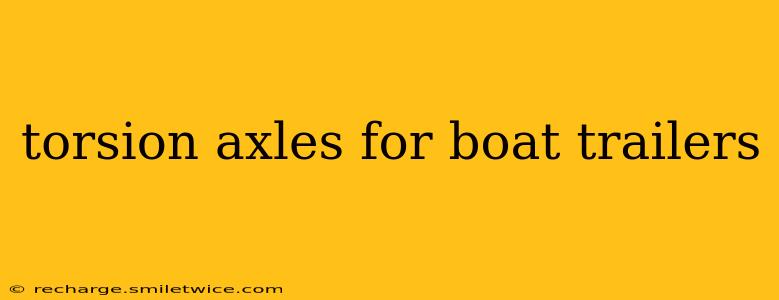Choosing the right trailer axle is crucial for safe and smooth boat transportation. Torsion axles have become increasingly popular, offering several advantages over traditional leaf spring axles. This comprehensive guide explores the benefits, drawbacks, and considerations when selecting torsion axles for your boat trailer.
What are Torsion Axles?
Torsion axles utilize a rubber-like material or a twisting bar to absorb shocks and bumps encountered during towing. Unlike leaf spring axles that use metal springs, torsion axles rely on the twisting action of a torsion bar or rubber component within a housing. This design provides a smoother ride and better suspension.
Advantages of Torsion Axles for Boat Trailers
Torsion axles offer several key advantages that make them a preferred choice for many boat owners:
-
Smoother Ride: The primary benefit is the superior ride quality. The torsion system absorbs shocks more effectively, resulting in less jarring and a more stable towing experience, especially important when hauling heavier boats.
-
Reduced Maintenance: Torsion axles generally require less maintenance compared to leaf spring axles. There are fewer moving parts to wear out or require lubrication, leading to lower long-term costs.
-
Improved Handling: The smoother suspension contributes to better handling, making it easier to maneuver the trailer, even on uneven terrain. This translates to greater control and safety while towing.
-
Corrosion Resistance (in some models): Some torsion axles are constructed with materials that offer superior corrosion resistance, extending their lifespan, especially beneficial in coastal environments where salt spray is common.
-
Increased Payload Capacity (potential): While not universally true, some torsion axle designs can accommodate higher payload capacities than equivalent leaf spring systems.
Disadvantages of Torsion Axles for Boat Trailers
While torsion axles offer many advantages, it's important to acknowledge potential drawbacks:
-
Higher Initial Cost: Torsion axles typically have a higher initial purchase price compared to leaf spring axles.
-
Repair Challenges: While maintenance is lower, repairs can be more complex and expensive if the torsion bar or rubber component fails. Specialized tools and expertise might be required.
-
Less Adjustability: Adjusting the ride height and suspension characteristics is generally more limited with torsion axles than with leaf spring axles.
-
Limited Availability: Depending on your location and trailer size, finding torsion axles for replacement might be more challenging than finding leaf spring axles.
What Size Torsion Axle Do I Need for My Boat Trailer?
Determining the correct size of torsion axle depends on several factors:
-
Boat Weight: The total weight of your boat, including gear and motor, is the most crucial factor. The axle must have a weight capacity exceeding this total weight.
-
Trailer Size and Type: The overall dimensions and type of your trailer will also influence the axle selection. Consult your trailer's manufacturer specifications or a trailer specialist for guidance.
-
Axle Configuration: Single or tandem axle configurations will impact the weight distribution and the axle's required capacity.
How to Maintain Torsion Axles
Regular maintenance is key to prolonging the life of your torsion axles:
-
Visual Inspection: Regularly inspect the axles for any signs of damage, cracks, or leaks.
-
Lubrication: While often requiring less lubrication than leaf springs, check manufacturer recommendations for any necessary lubrication points.
-
Bearing Inspection: Pay close attention to the wheel bearings, ensuring they are properly lubricated and in good working condition.
Are Torsion Axles Better Than Leaf Spring Axles for Boat Trailers?
There is no universally "better" option; the best choice depends on your specific needs and priorities. Torsion axles provide a smoother ride and potentially less maintenance, while leaf spring axles are generally more affordable and easier to repair. Weigh the advantages and disadvantages based on your boating and towing circumstances.
Frequently Asked Questions (FAQs)
Are torsion axles good for saltwater?
Some torsion axles are designed with corrosion-resistant materials and are suitable for saltwater environments. However, it's crucial to check the manufacturer's specifications to ensure they are adequately protected against corrosion. Regular washing and rinsing with freshwater after saltwater exposure is always recommended.
How long do torsion axles last?
The lifespan of a torsion axle varies depending on usage, maintenance, and environmental factors. With proper care, they can last for many years.
How much do torsion axles cost?
The cost varies greatly depending on the size, capacity, and brand. Expect a higher initial investment compared to leaf spring axles.
Can I install a torsion axle myself?
While possible for some mechanically inclined individuals, installing a torsion axle can be a complex process. It's advisable to seek professional assistance from a trailer repair shop to ensure proper installation and safety.
This detailed guide should provide a clearer understanding of torsion axles and help you make an informed decision when choosing the right axle for your boat trailer. Remember to consult with trailer professionals for personalized advice based on your specific boat and trailer setup.
